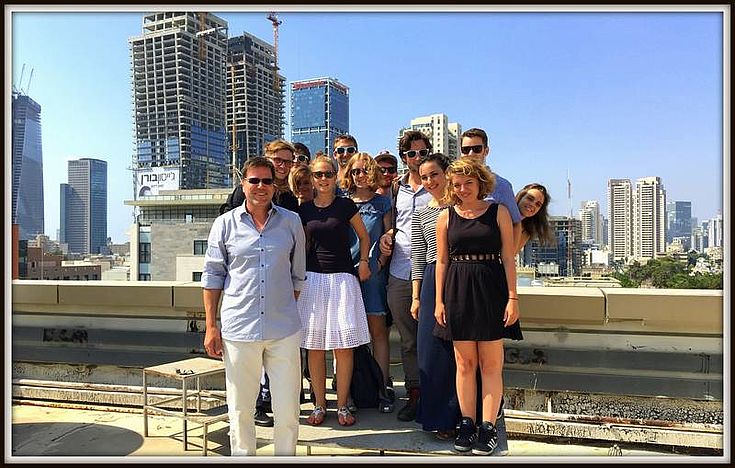Exchange of Journalism Students Israel-Germany
It was the first time that the Deutsche Journalistenschule Munich, took part in an student exchange program with an Israeli counterpart, the Tel Aviv University's Department of Communications Koteret School of Journalism (TAU). The project spanned from July 18 until August 2, the first week took place in Munich and the second week in Israel. The objective of the project was to arrange for an academic exchange for 16 students of journalism from both schools, with the intention to discuss the various challenges for journalists in both countries and to provide the students with insight into the complex relationships and backgrounds of the other society.
Over the span of one week in Munich, the Israeli students met with and interviewed various community leaders, NGOs, activists, politicians, and journalists from top media outlets about the refugee crisis that Germany in general, and Bavaria in particular, has been dealing with for almost one year. Bringing to light the complexity of the situation, from a political point of view, was the Bavarian Minister of Interior Joachim Hermann (CSU). During the interview with him, which took place the day after the Würzburg terror attack, he spoke about the complexity of the situation, in which issues of security, on the one hand, and issues of human rights and integration, on the other hand, need to be considered and managed together.
The students also heard about the refugee crisis from journalists, who spoke about how their reporting has become a challenging balancing act between the dire human plight of the refugees as well as, about the possible security threats that the situation presents. The editors and foreign correspondents of the Süddeutsche Zeitung: Jan Bielicki and Nadia Pantel, for example, discussed how their reporting has changed since the events in Cologne on New Year's Eve. While their reporting at first focused solely on the arrival of women and children and the welcoming euphoria with which German citizens greeted them, they recognized that after the Cologne events they needed to become more nuanced in their reporting and needed to address the rising concerns of German citizens as well.
BR reporter Lisa Weiss, who won several awards for her reporting about the refugee crisis, raised a further issue that the media is currently dealing with. While the term "refugee" has become a synonym for Syrian refugees, Weiss emphasized that the refugees come from various countries, among them the Balkan countries, whose citizens are not recognized by the EU as in need of asylum. When asked whether the origin of the refugee affects the media coverage, Weiss immediately responded: "people from Syria are the 'good refugees' and people from Kosovo are the 'bad refugees'". This generalized distinction, she claimed, is dangerous as it ignores the individual case and the complexity of the situation: "you have for example many Roma who come to Germany, who are considered part of the general Balkan 'economic refugees', but they are among the most discriminated people in Europe".
The unique opportunity given to the Israeli journalism students to conduct interviews with a multitude of persons, representing the many facets of German society, was for one student a way to get "to know the refugee situation deeper and to hear personal stories from the people who came here. In addition it was fascinating to have a perspective of the way journalism works outside of Israel". Another student was fascinated more about the origin of the people he interviewed: "my favorite part was the opportunity, as an Israeli, to interview a pair of Syrian refugees ".
While the visit in Germany focused on the refugee crisis, the one-week program in Israel gave a broad view of Israeli politics, society and journalism. On a political level, the German students met with Member of Knesset Yehuda Glick (Likud) and with Member of Knesset Yaakov Peri (Yesh Atid), from whom they heard about the internal conflicts within Israeli society. The students also met with Maj. Arye Sharuz-Shalicar, IDF Spokesperson for European journalists in Israel. The meeting with him focused on his personal story as an Iranian Jew growing up among Muslims in Wedding-Berlin, and on how the IDF sees and deals with the security situation that Israel is confronted with along its borders.
On a journalistic level, the German students met with local as well as with German journalists working in Israel, who report about the conflict. Among such meetings was a tour of the ARD Radio studio in Tel Aviv and a discussion with reporter Torsten Teichmann, as well as a meeting with Hanns Christian Rößler reporting for the Frankfurter Allgemeine Zeitung (FAZ). From the Israeli side the students met with journalist Akiva Eldar previously from Haaretz and currently from Al-Monitor, and with Tal Heinrich, one of the first female sports journalists in Israel and a reporter for CNN and i24 News. From Tal the students heard about working in the media industry as a young woman, and about the importance of having more local reporters reporting for foreign media outlets, as a way to increase a more complex and nuanced view of the situation in the region.
These political and journalistic meetings allowed the students to gain a more dimensional view of Israel, as one German student said: "for me the Israeli-Palestinian conflict was always 2-dimensional, from what I read in newspapers, but now I gained a more complex and nuanced perspective".
A meeting also took place with The Hotline for Refugees and Migrants, which is Israel's leading organization protecting the rights of refugees. There the students heard about Israel's asylum system from attorney Asaf Weitzen, and heard the personal story of an Eritrean refugee.
As a result of the project, the TAU published eight articles on the Koteret website that the students wrote based on their interviews in Munich.
Thus we concluded a successful pilot program and are looking forward to continue this project with our new partners, as a way to further the German-Israeli bilateral relations.

